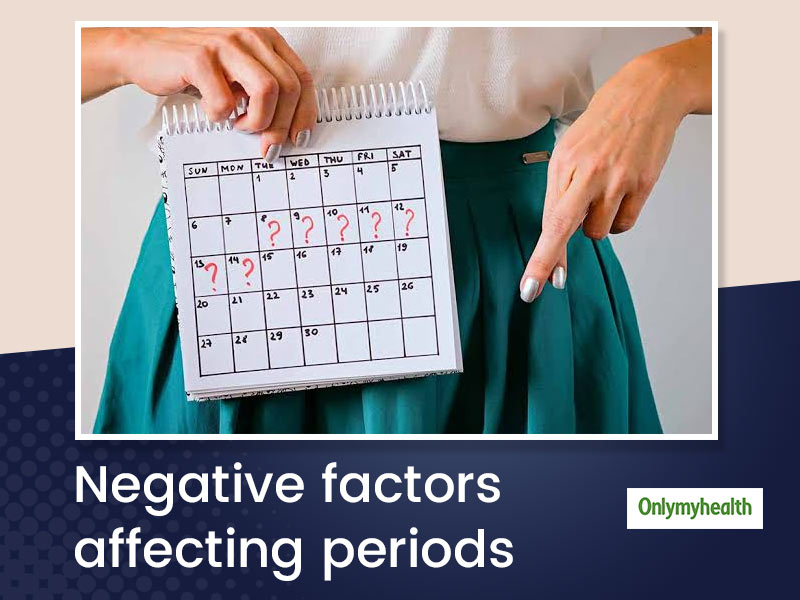
Your menstrual flow can tell a lot about your health. Irregular or no periods is an indication of some underlying lifestyle problem or a medical issue in your body. Menstruation should normally occur every 21 to 35 days and last for two to seven days. However, some girls experience several problems in having regular periods/proper flow. One can start keeping a track to notice the pattern of periods. Onlymyhealth editorial team spoke Dr.Pratibha Singhal, Department of Gynecology and Obesetriction Director, Cloudnine Group of Hospitals, Noida about the negative factors having an impact on your menstrual cycle. Read on to know the details about these reasons.
Table of Content:-
Factors affecting menstrual cycle
Regular menstrual cycle and a good menstrual flow are indications of good reproductive health. This is controlled by various parts of the brain like hypothalamus and pituitary, and down by ovaries. According to Dr. Pratibha Singhal, there are various non medical factors in the day to day life that can affect your reproductive health in a negative way. They are:
1. Stress

Whenever a girl has stress, either in her personal life or at workplace and even if she’s frequently travelling that also causes stress. And stress always disturb your menstrual cycle. Periods may become more frequent or may even get delayed. As it is controlled from the brain, the hypothalamus is mainly affected by stress. As a result, the downward effect of hypothalamus gets disturbed and the menstrual cycle gets disturbed.
2. Malnutrition
Being underweight or being anaemic, having less proteins in the body is also a factor causing disturbed menses.
Also read: 5 Mistakes you’ve been making with your periods every month
3. Coffee/tea
If coffee or tea are being consumed in large numbers can also cause the same stressful condition as smoking. Therefore, it’ll also disturb the menstrual cycle.
4. Alcohol

A very common factor for irregular periods in present generation is alcohol. One or two drinks taken daily doesn't affect the menses. But, if any girl starts having a lot of alcohol or becomes a regular alcoholic then it will effect her periods. As the increased intake of alcohol leads to weight gain and poor nutrition. Anyone having more alcohol will not be able to take adequate and nutritive food. This leads to weight gain and whenever the girl is heavy, she has more estrogen which stores enough fat. So, excess estrogen in the body will definitely lead to weight gain, resulting in irregular menstrual cycle or heavy menses.
5. Obesity
Weight gain is also a major reason for disturbed periods. Or if the BMI is more than 25, it can also affect negatively on your cycle. Excess weight gain due to alcohol, in the fatty layer below the skin, the estrogen gets stored and they keep on getting released in the circulation causing hormonal disturbance.
6. Smoking
The next very common reason that may affect your periods is smoking. Smoking also leads to a stressful condition in the body, and which will again give menstrual disturbances to some extent through hypothalamus.

Heavy exercise, travelling, age, lack of sleep and sudden weight loss can also have an impact on your periods negatively. These were the non medical reasons or lifestyle factors. Here are the medical factors that can have an impact on menstruation:
1. Thyroid
Hypothyroidism is one of the factors that is very important. If a girl has less thyroid hormones in the body with increased TSH (Thyroid stimulating hormones). Menses can get disturbed/frequent and can lead to weight gain/loss too.
Also read: Ovulation & fertility facts to help you get pregnant
2. Polycystic ovary Syndrome
Most of the population suffers from this condition. In PCOS, there's obesity and more estrogens are stored, less frequency of egg formation and other factors like insulin resistance and more male hormones, that leads to infrequent menstruation. It can result in heavy flow or irregularity.
These were the factors that can affect your menstrual cycle negatively. All these things lead to anxiety and it will lead to abnormal menses from hypothalamus. It can also affect in reducing the menstrual flow. Dr. Pratibha said, "One can make lifestyle changes if facimg a delay in periods. If the situations still doesn't change, then surely consult a gynaecologist. Your doctor will get a clinical diagnosis done to give appropriate treatment. You might have to get various hormonal levels checked in the blood and an ultrasound too."
Read more on Women's health
Also watch this video
How we keep this article up to date:
We work with experts and keep a close eye on the latest in health and wellness. Whenever there is a new research or helpful information, we update our articles with accurate and useful advice.
Current Version
